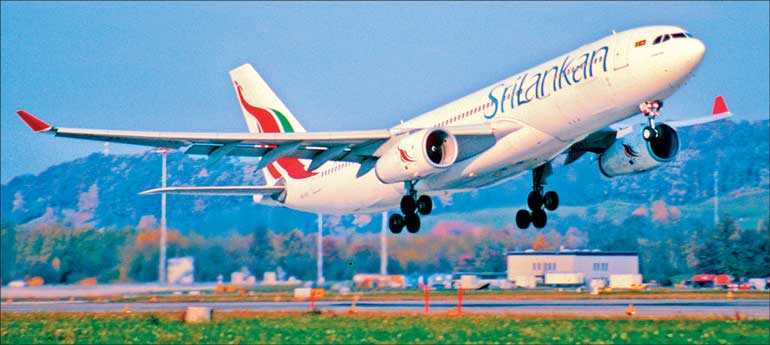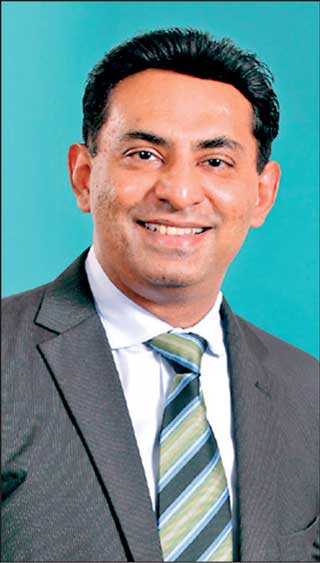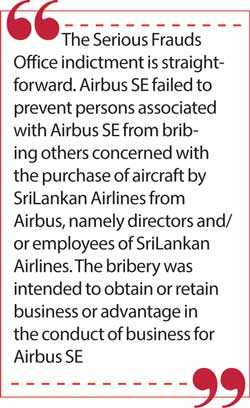Tuesday Feb 17, 2026
Tuesday Feb 17, 2026
Friday, 7 February 2020 00:20 - - {{hitsCtrl.values.hits}}

By The Pilot
The term ‘scapegoat’ has its origin in the Old Testament. It is in Chapter 16 of the Book of Leviticus. God instructed Moses and Aaron to sacrifice two goats every year. One goat was to be killed; its blood sprinkled upon the Ark of the Covenant. The High Priest was then to lay his hands upon the head of the
 |
Former SriLankan Airlines CEO
|
second goat and confess the sins of the people. Unlike the first goat, this lucky second goat was not to be killed but released into the wilderness together with its burden of sin, which is why it came to be known as the scapegoat.
The scape goat that we speak of, has a mysterious power. It captures and captivates the curious and the ordinary demanding the quick fix. The scapegoat serves the immediate purpose of appeasing our collective desire to mete out punishment to, to make an example of deserved retribution to the wrong doer or anyone who makes a good substitute for the villain.
Scapegoating is an escape hatch for the authentic villains. The futile exercise is a chase for inconsequential details. Its purpose is to create disorder to botch the grand total of the foul deed.
The illustration in the official Press release of UK’s Serious Frauds Office says it all. It is a graphic outline of the essence of the global settlement reached by Airbus SE with UK’s Serious Frauds Office, France’s Parquet National Financier and USA’s Department of Justice.
The aircraft manufacturer has been fined in relation to five counts of failure to prevent bribery. Count 2 relates to its dealings with SriLankan Airlines.
This Deferred Prosecution Agreement “does not prevent any victims that there may be from claiming compensation”.
It also contains a vital caveat that we should take note of. The Serious Fraud Office had entered into an agreement with PNF – its French counterpart – to probe bribery and corruption allegations in relation to Airbus, its business partners, former and current employees and other third parties.
French law No 68-678 of 26 July 1968 (the French Blocking Statue or FBS) prohibits certain disclosures of information by French persons and entities in foreign judicial and administrative proceedings.
It points out further that under 694-4 of the French Code of Criminal Procedure, French Judicial authorities are also entitled to exclude from their responses in mutual legal assistance requests, information that would be detrimental to the essential interests of France. In the present case, the French authorities concluded this included making specific contract values public. The French authorities also controlled the supply of documents to the SFO to ensure compliance with the French restrictions on such information. That means the SFO has got only part of the story.
information that would be detrimental to the essential interests of France. In the present case, the French authorities concluded this included making specific contract values public. The French authorities also controlled the supply of documents to the SFO to ensure compliance with the French restrictions on such information. That means the SFO has got only part of the story.
The DPA will be in force until 31 January 2023. The SFO has the discretion to initiate action against any individuals should it be required.
In her judgment, Dame Victoria Sharp President of the Queen’s Bench notes: “The seriousness of the criminality in this case hardly needs to be spelled out. As is acknowledged on all sides, it was grave. The conduct took place over many years. It is no exaggeration to describe the investigation it gave rise to as worldwide, extending into every continent in which Airbus operates. The number of countries subject to intense criminal investigation by the various agencies, and the scale and scope of the wrongdoing disclosed in the Statement of Facts demonstrate that bribery was to the extent indicated, endemic in two core business areas within Airbus.”
The five counts in the indictment refers to Malaysia, Sri Lanka Taiwan, Indonesia and Ghana in that order. Each of these counts on the Indictment concerns similar conduct explained in the Statement of Facts that should be read along with the approved judgment.
The judgment concludes that “persons associated with Airbus, not exclusively its employees, offered very substantial sums of money by way of bribes to third parties in order to secure the purchase of aircraft, by civil airline companies”.
The judgment explains why persons of interest are not named.
“In the Statement of Facts, the identity of the individuals concerned has not been included. There are ongoing investigations in respect of a number of individual suspects in this jurisdiction and abroad. It is appropriate to protect the rights of the suspects to a fair trial.”
UKEF is the UK’s Government funded export credit agency. It provides finance and insurance to bolster exports and international trade. The blurb on their website assures that they “support complex international projects through financing, export credits and insurance.”
The UKEF demands strict due diligence criteria.
“We’ll need to understand how the contract was awarded, including any use of third parties or agents, and will require Anti-Bribery and Corruption declarations from counterparties to the transaction. We may be unable to support the transaction if sanctions have been imposed on any of the countries or counterparties involved in the transaction. We’ll also consider the environmental, social, and human rights impact of the project.”
It is the UKEF that alerted the Serious Frauds Office about the jiggery-pokery they sniffed in the Airbus transaction with SriLankan Airlines. 
The Statement of Facts which forms a part of the Differed Prosecution Agreement provides an intriguing narrative of how things exploded. It is a gripping narrative. It begins with the common place recital. “Sometime between December 2013 and November 2015, SriLankan Airlines entered into a sale and lease back agreement with an aviation leasing company, for five of the A330 aircraft.”
Pursuant to this agreement the aviation leasing company would purchase the aircraft from Airbus and lease them to SriLankan Airlines. Four of these aircraft were due to be delivered in February, July, September and December of 2015.
In November 2014 Airbus employees submitted an application for export credit financing to UKEF in respect of the four A330 aircraft the first of which was due to be delivered at the end of February 2015.
The application required disclosure of any agent or consultant involved in the purchase agreement.
Airbus indicated that it had used an agent on the Sri Lankan negotiations. Airbus at this point wished to invoke the Special Handling Process within UKEF.
This Special Handling Process allowed applicants to disclose the identity of an agent in a manner that the identity of the agent would be available only to three members of the UKEF staff.
UKEF discontinued this practice from effective April 2017 in the interest of greater transparency and as a measure of its anti-bribery and anti-corruption reforms.
The special handling process ensured that only a small number of individuals within UKEF would perform due diligence on the agent.
On or around 4 February 2015 Airbus submitted the agent details to UKEF.
A senior Airbus employee had assured UKEF that the information could be relied upon. The statement of facts asserts that the information submitted falsely suggested that the ‘intermediary’ was a ‘he’, and that the consultant agreement accurately reflected the total amount Airbus would pay.
UKEF informed Airbus that they were not satisfied with the details of the agent as provided. They asked a “series of questions. The CV suggested little aviation experience and why was the agent “domiciled and paid outside of Sri Lanka”. There was no mention of the market share agreement of the commission.
On 13 February 2015 Airbus provided answers to questions of UKEF on 13 February 2015. The Airbus response referred to the agent as both a ‘he’ and ‘she’.
Airbus once again failed to mention the market share agreement although UKEF insisted on confirmation that there were no other payments from Airbus to the company of the intermediary.
UKEF asked Airbus to confirm that its agent was not the wife of the ostensible SriLankan Airlines Executive.
Airbus responded on 26 February 2015. Airbus asserted to UKEF that the agent was not the wife of the executive of the airline and the agent had no links to SriLankan Airlines. The Statement of Facts has a revealing exchange of emails between Airbus and UKEF.
The Airbus employee liaising with UKEF forwards an email from the Sales and Marketing office of Airbus.
“Our research has identified the wife of the SriLankan Airlines executive as having the same name as the one we have been given.”
UKEF reverts to Airbus: “Please confirm that this is not a party to this issue and is not your agent. This is a homonymy but certainly not the same person.”
Airbus operative responds: “She is not a party to this issue, and she is not our agent.”
The tenacious due diligence official of the UKEF demands a precise answer.
“We assume this is a coincidence, but could you also confirm that your agent has no connection to the airline, its personnel or family members of staff and executives at the airline.”
Airbus employee responds, “We confirm.”
On 27 February 2015, UKEF personnel spoke with Airbus employee liaising with them another senior Airbus official but it failed to alleviate the concerns of UKEF.
The Airbus operative dealing with UKEF emailed his colleague at the home base. “The truth is most unfortunate.”
The other replied: “We know the truth I suspect but is that what we are intending to inform UKEF?”
Internal email exchanges at Airbus on 2 March also involving a very senior official of Airbus vividly reflect the dilemma of the aircraft manufacturer sailing close to the wind. At the highest level they have decided to answer to answer to UKEF and thereby take the risk to be demonstrated that Airbus was not compliant. But how long will it take to convince UKEF?
On or around 12 March 2015 Airbus withdrew its application from UKEF.
The UKEF reported this and other matters to the Serious Fraud Office on 1 April 2016. Sri Lankan airlines had been under the UNP nominated board of management for 15 months.
The Airbus request for financing from UKEF was made in November 2014.
‘Airfinance Journal,’ the leading financial publication of the global aircraft and aviation industry, reported that SriLankan Airlines has worked out a $ 650 million financing arrangement on 18 December 2014.
Seabury Consultants hired by SriLankan Airlines to advise them on the re-fleeting project issued a press release.
“Airfinance Journal, the leading intelligence resource for aviation finance, recognised Seabury Group for the innovative $69 million PDP financing of three A330-300s for SriLankan Airlines.”
Seabury Group served as advisers to SriLankan Airlines, which, in July 2013, agreed a combined predelivery payment (PDP) and sale/leaseback finance with operating lessors ILFC/AerCap and Hong Kong Aviation Capital.
The deal was an innovative purchase agreement novation structure to deal with SriLankan claw-back risk and contained an “unusual collaboration” of major operating lessors on a single account.
The airline benefited from the deal because new aircraft refleeting allowed it to operate an increased route network profitably and further enhance Sri Lanka as a destination brand since the cessation of hostilities in the civil war.
The Auditor General has stated that the airline had selected Seabury as the consultant without formally soliciting comparable proposals from all consultants, without ensuring confidentiality of proposals, and with multiple other procedural errors.
The Serious Frauds Office indictment is straightforward.
Airbus SE failed to prevent persons associated with Airbus SE from bribing others concerned with the purchase of aircraft by SriLankan Airlines from Airbus, namely directors and/or employees of SriLankan Airlines. The bribery was intended to obtain or retain business or advantage in the conduct of business for Airbus SE.
References:
www.judiciary.uk›wp-content›uploads›2020/01›Director-of-th.
https://www.sfo.gov.uk/download/airbus-se-deferred-prosecution-agreement-statement-of-facts/#